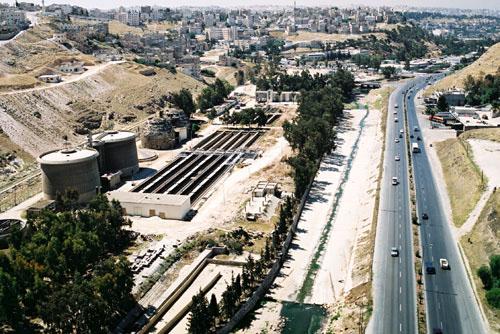You are here
Work to revamp, expand Karak wastewater plant begins
By Hana Namrouqa - Aug 20,2015 - Last updated at Aug 20,2015
AMMAN — Rehabilitation and expansion of the Karak Wastewater Treatment Plant commenced on Thursday to raise the facility’s capacity by sevenfold by the year 2017.
Under an agreement signed on Thursday between the Ministry of Water and Irrigation and an alliance of Aqua Treat and OTV companies, the treatment plant will be renovated and expanded to raise its capacity from the current 800 cubic metres per day to 5,500 cubic metres per day once the project is completed.
Water Minister Hazem Nasser said on the sidelines of the agreement signing that in light of the growing population in Karak, some 120km south of Amman, the treatment plant, which was established decades ago, no longer has the capacity to meet the increasing flow.
“The plant will be rehabilitated and expanded in cooperation with the [German Development Bank] KfW at a cost of 10 million euros to improve the city’s health and environment conditions and generate treated wastewater to be used for restricted cultivations, mainly fodder,” Nasser said.
He underscored that the ministry opened in 2013 the Adnaniyeh Wastewater Treatment Plant to serve residents of the Southern Mazar, Mutah and Adnaniyeh in Karak.
Both facilities are projected to receive and treat wastewater generated in the governorate until the year 2035, according to the ministry.
Water Authority of Jordan Secretary General Tawfiq Habashneh said 62 per cent of households in the Kingdom are linked to the sewage network, underscoring that plans are under way to raise the number to 70-75 per cent by 2020.
“Once the rehabilitation and expansion of Karak Wastewater Treatment Plant is completed, both treatment plants will be serving 40 per cent of Karak residents,” Habashneh told The Jordan Times.
Meanwhile, Nasser stressed that extending wastewater networks is very costly, noting that the cost of linking one household to the sewage network ranges between JD8,000 and JD17,000, while linking one household to the water network costs JD3,300, of which JD3,000 is paid by the government.
“The government has so far invested JD4 billion in wastewater projects,” Nasser noted.
He highlighted that the ministry implements wastewater projects according to certain priorities, including population density, proximity to freshwater resources and whether the area has the potential for cultivation.
Karak has a population of over 260,400 people, according to the Department of Statistics’ 2014 estimates. The governorate is home to several of the country’s main wells, streams and dams.
Nasser said Jordan’s 32 wastewater treatment plants treat 120 million cubic metres of wastewater, all of which are used for the irrigation of specific crops, mainly fodder.
Related Articles
AMMAN — Construction on the first and second phases of a JD76-million project to upgrade wastewater services in Naour District and adjacent
Studies are under way to select a new location for the Ain Ghazal Wastewater Treatment Plant, Ministry of Water and Irrigation officials said on Thursday.
With the renovation of the Ain Ghazal Wastewater Treatment Plant now complete, the Water Ministry has announced plans to relocate the facility within two to three years.

















